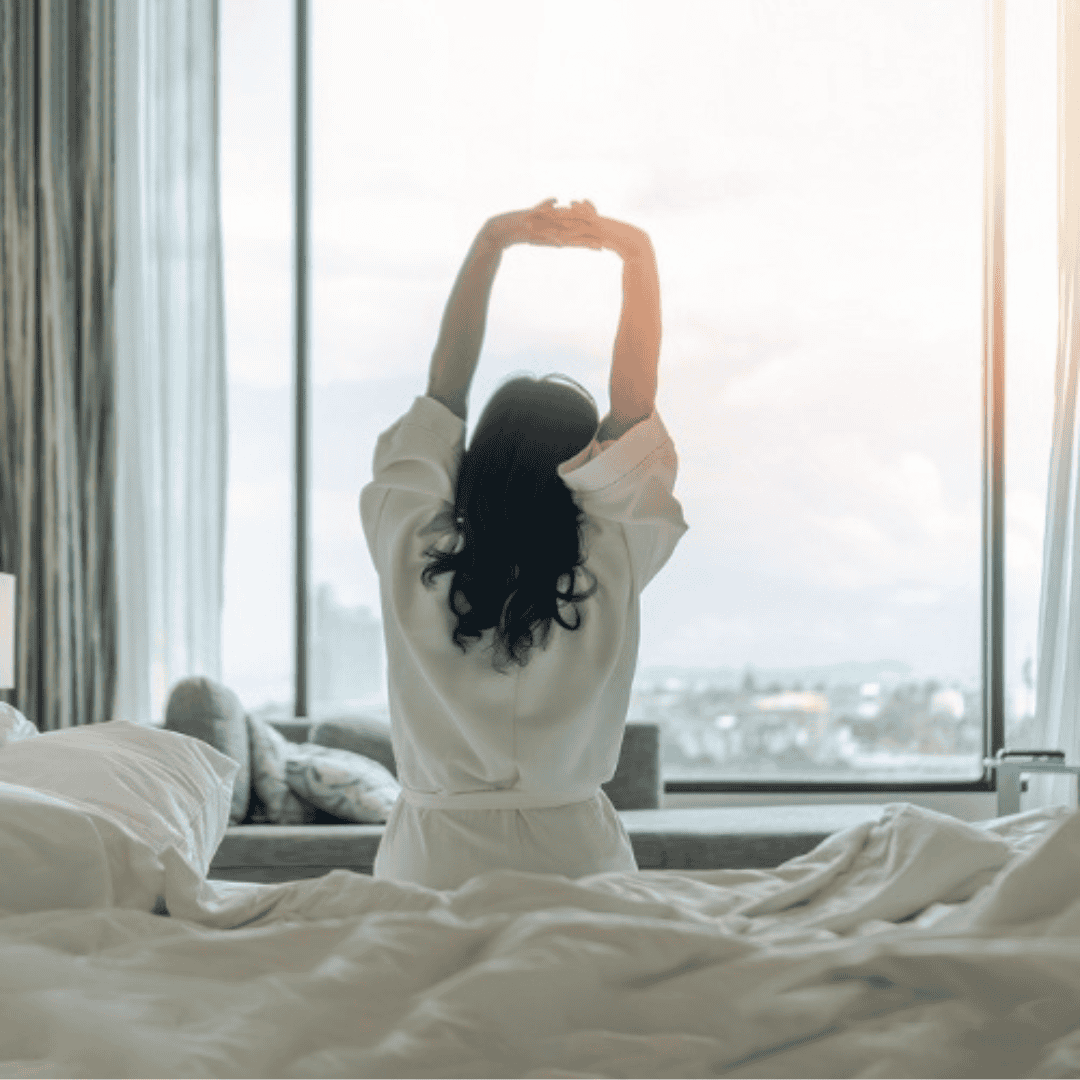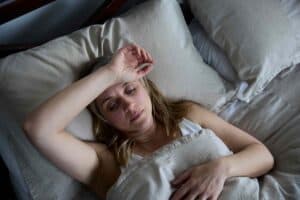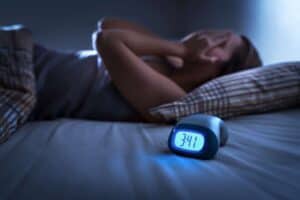Medically reviewed by Catherine Hansen, MD, OBGYN & Menopause specialist
Menopause often brings with it a wave of sleep disruptions, leaving many to wonder how to restore a peaceful night’s rest. This article delves into the hormonal upheavals that affect “menopause and sleep”, outlining practical, evidence-based measures to enhance your sleep quality during this transitional phase and beyond.
In this complete article we will learn about:
- How menopause can have an impact sleep
- Explore some treatment options for sleep issues
- Address sleep apnea and restless legs syndrome
- Tips on lifestyle adjustments to improve sleep quality
Understanding Menopause-Related Sleep Disruptions
Does it feel like good sleep has become a distant memory since you hit menopause? You’re not alone. Menopause-related sleep disruptions often start during perimenopause and can persist throughout the menopausal transition. Menopausal symptoms due to hormonal decline, exacerbated by symptoms such as hot flashes, and night sweats, are common culprits keeping menopausal women up at night. Vasomotor symptoms can contribute to sleep disturbances and vice versa.
Understanding the nuances of these disruptions is crucial to addressing them. For instance, during menopause, women experience a decrease in REM sleep and often wake up feeling less rested. This intricate dance between menopause and sleep can lead to poor sleep quality, chronic insomnia, and other sleep disorders. But don’t worry, we’re here to help you make sense of it all and find solutions that work for you.
The Impact of Hot Flashes on Sleep Quality
Hot flashes can feel like an unexpected volcano eruption, disrupting body temperature regulation and leading to frequent waking during the night. These nighttime hot flashes are often accompanied by unexpected awakenings, disrupting the sleep cycle. In addition, changes in the brain that lead to hot flashes may also trigger awakenings during sleep.
This triple whammy of hot flashes, disrupted body temperature, and sleep disturbances, including sleep disordered breathing and sleep disturbance, can take a toll on your sleep quality.
Night Sweats and Their Effect on Staying Asleep
Imagine trying to sleep while your body is mimicking a waterfall. That’s what night sweats can feel like. Night sweats during menopause can cause a sudden warmth or a flush in the face, neck, and chest, leading to excessive sweating. The excessive sweating as the body tries to cool itself often disrupts sleep, causing women to wake up during the night.
Staying asleep becomes a Herculean task for many women during menopause due to these more fragmented sleep patterns, often as a result of night sweats, making it difficult to fall asleep. These sleep symptoms can make staying asleep quite challenging.
Hormonal Fluctuations and Sleep Disturbances
Menopause is like a hormonal roller coaster ride, with decreases in estrogen and progesterone levels that can lead to sleep disturbances and insomnia. The decline in progesterone, which has a sedative effect, can make women more irritable and less able to relax, further contributing to sleep disruptions during menopause.
Hormonal fluctuations during menopause can also lead to night sweats and hot flashes, which can wake the brain and interrupt sleep. Additionally, decreased melatonin production can disrupt sleep patterns, leading to difficulties in falling asleep, frequent awakenings at night, and early morning wakefulness. Up to 60% of women going through menopause experience some form of insomnia, signifying a high prevalence of sleep issues during this period.
Exploring Treatment Options for Menopausal Sleep Issues
When it comes to treating menopausal sleep issues, one size doesn’t fit all. It’s all about finding the right treatment that suits your body and lifestyle. Menopausal Hormone therapy (MHT) also known as Hormone replacement therapy (HRT) is one such treatment option that can improve sleep quality in menopausal women by alleviating symptoms like hot flashes and night sweats.
However, it’s important to bear in mind that while hormone replacement therapy is effective, it’s essential to be aware of the potential risks and discuss them with a healthcare provider. That’s where Pandia Health comes in. At Pandia Health, you can receive personalized menopausal treatment, including estrogen-only therapy or combined estrogen-progesterone therapy, to address sleep issues related to menopause symptoms.
Cognitive Behavioral Therapy as a Non-Medication Approach
While medication can help, sometimes, non-medication approaches can be just as effective. Cognitive behavioral therapy (CBT) is recognized as a first-line treatment for chronic insomnia, particularly beneficial for individuals going through menopause. CBT for insomnia is a structured, problem-solving approach that has been scientifically shown to improve sleep in women experiencing menopausal symptoms. Some key components of CBT for insomnia include:
- Sleep hygiene education
- Stimulus control therapy
- Sleep restriction therapy
- Relaxation techniques
- Cognitive restructuring
By incorporating these strategies into your routine, you can improve your sleep and manage menopausal symptoms more effectively.
It includes techniques such as:
- Behavioral adjustments
- Stimulus control
- Sleep restriction therapy
- Relaxation therapy
As a non-medication approach, CBT offers a sustainable, effective and long-term alternative to prescription medications.
Menopausal Hormone Therapy (MHT): Benefits and Considerations
Menopausal Hormone Therapy (MHT), previously known as Hormone replacement therapy (HRT), can alleviate menopausal symptoms by replacing the hormones that the body may be lacking after menopause, potentially aiding in better sleep for peri and early menopausal women.
The use of MHT must take into account potential health risks, necessitating a thorough evaluation of a woman’s health history and personal risk factors for conditions such as cardiovascular disease and breast cancer. Therefore, it is essential for women to engage in detailed discussions with a doctor regarding the risks and benefits of MHT to determine the most suitable treatment approach for their menopausal symptoms and associated sleep disturbances.
Addressing Sleep Apnea and Restless Legs Syndrome
Sleep disruptions during menopause aren’t just limited to hot flashes and night sweats. Conditions like obstructive sleep apnea and restless legs syndrome (RLS) may emerge or worsen during this period. For instance, postmenopausal women are two to three times more likely to have sleep apnea compared with premenopausal women, affecting approximately a quarter of women in the years leading up to menopause and more than a third following it.
Restless Legs Syndrome (RLS) is another condition that can affect sleep. It causes discomfort and an uncontrollable urge to move the legs, primarily during the evening or nighttime. Factors such as antidepressants, caffeine, alcohol, and smoking can exacerbate RLS symptoms. These conditions require proper diagnosis and management. Some management options include prescriptions and replacement of nutritional deficiencies if detected.
Lifestyle Adjustments to Enhance Sleep During Menopause
While medical treatments can help, lifestyle adjustments can also play a crucial role in enhancing sleep quality during menopause. Good sleep hygiene practices, such as adopting a consistent sleep schedule, avoiding heavy meals, caffeine, nicotine, and alcohol before bed, can significantly enhance sleep quality.
Engagement in stress-reducing activities, like enjoyable exercise that releases endorphins and adopting relaxation routines, can contribute to better sleep quality as well.
The Role of Exercise in Promoting Better Sleep
Regular exercise is like a magic pill for good health – and that includes better sleep. Regular exercise can help improve sleep quality for those experiencing menopause. Moderate aerobic exercise increases the amount of deep sleep, aiding brain and body recovery, while incorporating yoga or light stretching into the bedtime routine may also positively affect sleep.
For optimal sleep quality, it is advised to exercise regularly but not close to bedtime, avoid large meals before sleep, and stay away from caffeine and alcohol.
Optimizing Bedroom Environment for Good Sleep
Your bedroom environment plays a significant role in how well you sleep. Here are some tips to create a sleep-friendly bedroom:
- Remove electronic devices from the bedroom, such as TVs and phones, to aid in falling asleep quicker and reducing disturbing stimuli.
- Utilize bedding made from breathable materials like cotton to enhance temperature regulation, which is essential for quality sleep.
- Incorporate cooling pillows to further enhance temperature regulation during menopause.
Some tips for managing night sweats and promoting uninterrupted sleep include:
- Wearing moisture-wicking pajamas
- Having a change of clothes or bedding nearby
- Keeping the bedroom at a comfortable temperature, perhaps through cross ventilation or air conditioning
Following these tips can help manage discomfort from night sweats and create a setting conducive to sleep.
The Convenience of Pandia Health for Menopausal Care
Now, wouldn’t it be great if you could get all the help you need to navigate menopause from the comfort of your home? That’s exactly what Pandia Health offers. With Pandia Health, you get:
- Convenient and flexible menopause treatment
- 365 days access to menopause doctors
- Prescriptions delivered to your mailbox with free shipping, eliminating the need to go to a pharmacy or waiting in endless lines.
- Pandia Health provides personalized FDA-approved bioidentical hormone treatment for menopause, with treatments facilitated by industry-recognized menopause doctors.
Menopausal care through Pandia Health includes:
- Cost-effective options, with insurance acceptance and affordable self-pay options for MHT medications
- Lifestyle information and resources to enhance the treatment experience
- Free goodies alongside medication delivery service
If you are ready to experience hassle-free menopausal care, Sign up for an online consultation with Pandia Health today and take control of your journey with convenience and expert guidance!
Takeaway
Navigating menopause can feel like a bumpy ride, especially with sleep disruptions thrown into the mix. Armed with the right knowledge and strategies, you can handle it with grace and ease. Remember, it’s all about understanding the changes your body is going through and finding the right treatment that suits your body and lifestyle.
Whether it’s hormone replacement therapy, cognitive behavioral therapy, regular exercise, or optimizing your bedroom environment, every little change can make a big difference. And with the convenience of Pandia Health, you can be sure you are getting personalized, high-quality menopausal care right at your doorstep.




